Use AI marketing tools to automate and scale your strategy
Learn how to choose the right AI marketing tool by comparing intelligence levels, automation depth, and structural fit for your team’s workflow and goals.
If you’re not making the most of the latest AI marketing tools then you’re at serious risk of being left behind by your competition.
Because here’s the thing, according to an industry poll performed by Epsilon Marketing, 94% of businesses are using some form of artificial intelligence to prepare or execute their marketing.
Fall behind during digital marketing’s AI revolution and you might find yourself spending years playing catchup on your competitors.
Of course, rushing to buy the hottest AI marketing tools because you’re afraid of missing out is an easy way to end up with subscriptions to expensive tools that your team never uses.
In this article, we’ll walk you through the key capabilities of the latest AI marketing tools—and give you a framework you can use to evaluate which are the best fit for your needs.
We’ll also run through the limitations of today’s AI-powered tools so you can better understand which tasks they’re best suited for—and which are best left to the humans (for now at least).
What is an AI marketing strategy?
An effective AI marketing strategy is one that leans on artificial intelligence, machine learning, and large language models to achieve its goals by harnessing AI as beneficially as possible.
That might involve using AI to:
- Personalize email marketing sequences and improve outreach
- Analyze marketing data
- Speed up the content creation process
- Quickly create social media posts, graphics, and images
- Forecast campaign performance and accelerate decision-making
- A/B test CTA copy
- Track brand mentions and analyze their sentiment
AI is still a developing technology. But it’s moving fast, with new tools and AI models hitting the market all the time. If you’re late to the game, the early adopters in your space might be so far ahead that you’ll struggle to catch up.
Think of the first companies to recognize the potential of search engine optimization. Early movers like HubSpot dominated that channel for over a decade after being one of the first to execute an SEO content strategy at scale and build an entire marketing platform around it.
As a result, the company’s traffic peaked at a massive 24 million visits a month (before AI itself disrupted SEO, reducing the amount of traffic a lot of organizations are now seeing from the channel).
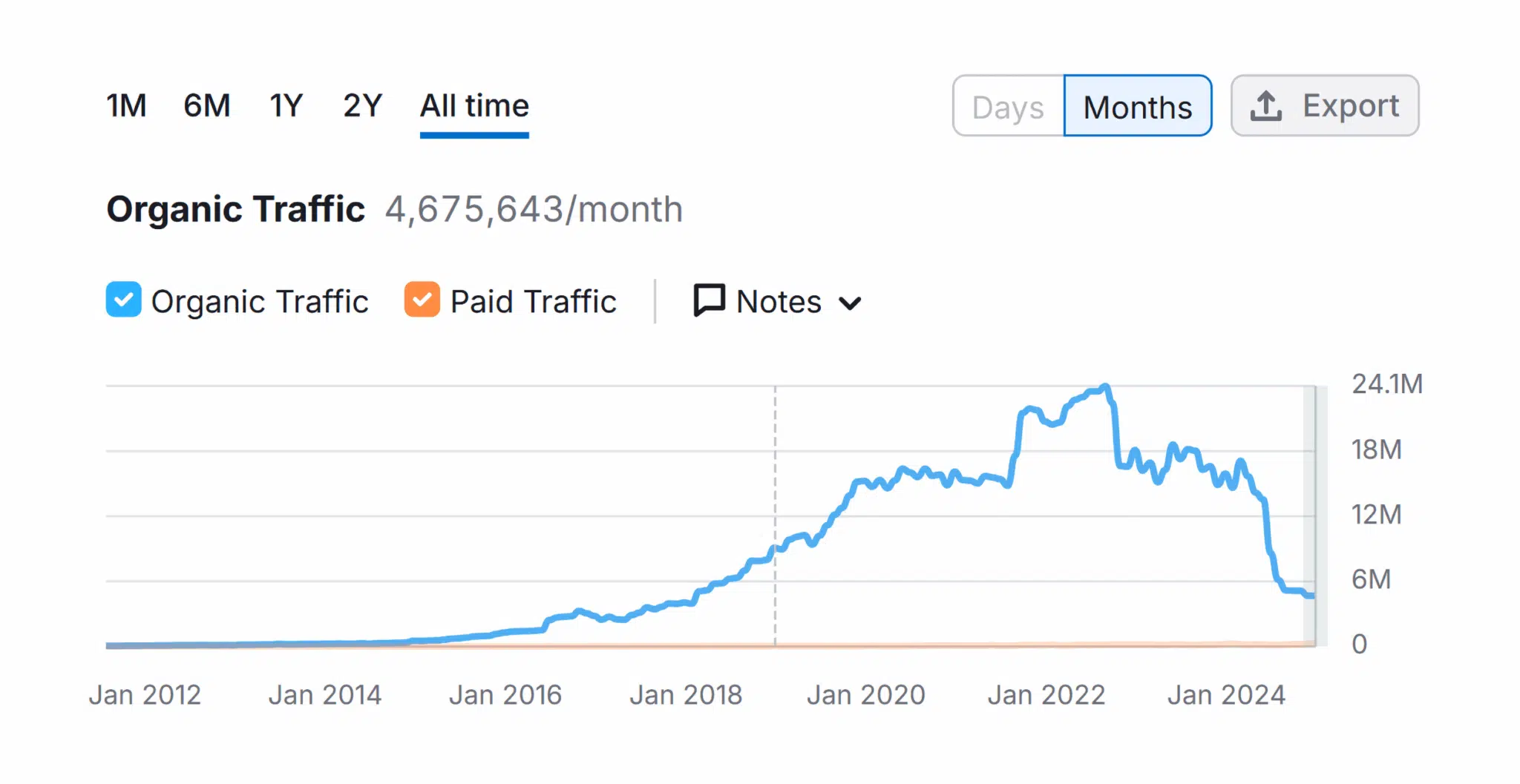
Become one of the first organizations to execute an effective AI marketing strategy in your vertical and you could get an insurmountable headstart on your competition—like HubSpot’s in the SEO space.
The most effective AI marketing strategies use artificial intelligence to automate the grunt work to free up time and energy to concentrate on the tasks that truly move the needle. For example, rather than getting a junior marketer to spend days trawling through call transcripts to unearth customer’s pain points, AI can provide those with the click of a button. It can then give you ten variations of ad copy for you to test based on the customer pain points it’s unearthed. And then it can review the performance of those ads in real-time, spot the top-performing copy, and A/B test tweaks that might drive even more clicks.
AI workflows like these automate days of human labor, meaning teams can launch campaigns faster, and more often, than ever. That presents a huge opportunity for anyone who masters AI marketing tools before their competition. And on the other side of that equation, it poses a huge threat to teams and individuals who fail to learn how to use artificial intelligence to create better work, faster.
Why businesses can’t afford to ignore AI marketing tools and strategies
Most organizations are executing an AI marketing strategy of some kind.
According to one of the largest studies of its kind performed by BCG and Google, the 20% of companies that are advanced AI adopters—the organizations integrating artificial intelligence into the majority of their workflows and building internal AI applications—report 60% higher revenue growth than their peers.
That’s a statistic worth repeating: advanced AI adopters are experiencing 60% higher revenue growth.
Which means the organizations that aren’t using AI marketing tools—or aren’t using them as effectively as they could be—are at risk of being left behind. Especially given that CoSchedule’s latest State of AI in Marketing report revealed that nearly 75% of marketers believe AI gives them a competitive advantage.
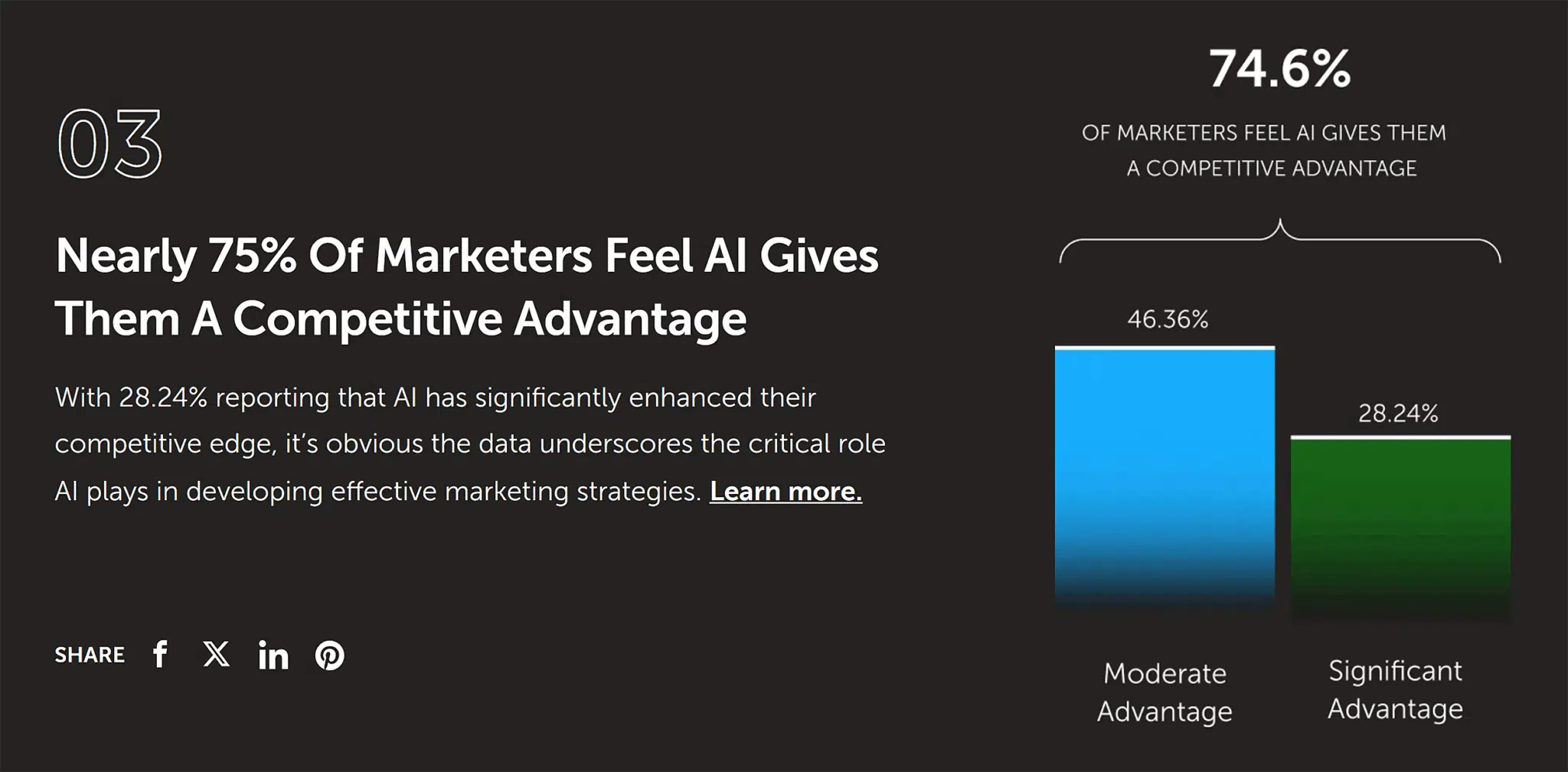
Plus, both the companies who have adopted AI early—as well as those who are lagging behind but still starting to adopt AI—are planning on increasing how much they’re using AI. Research by CoSchedule has revealed nine out of 10 marketers are set to ramp up AI integration this year, while a study performed by Epsilon shows 75% of those not currently using AI are planning to adopt it within the next year.
Which all means marketing teams simply can’t afford to not be testing ways to use AI to:
- Create text, images, and video for their campaigns
- Mine all the data at their disposal for insights that might inform their strategy
- Create audience segments based on real customer data (rather than guesswork)
- Automate their ad performance optimization
- Quickly respond to customer service queries with AI chatbots
- Optimize their workflows by automating the grunt work
Of course, AI marketing tools aren’t a silver bullet that will solve all of your marketing challenges overnight. But the organizations learning how to get the most from them right now could be leaps and bounds ahead of their competitors in years to come.
Key capabilities of AI marketing tools
There’s no doubt about it: AI is changing marketing forever. Tasks that used to take hours—like picking out key quotes from interview transcripts—are now done in an instant with the click of a button.
Artificial intelligence isn’t just automating grunt work, either. It’s being used for uniquely “human” tasks, too, like picking trends out of data and even responding to customer service queries.
Here’s how its being used most often by marketers right now:
Content creation & optimization
The most common way marketers are using AI currently is to speed up every step of content marketing.
According to research by Salesforce, a massive 76% of marketers are using generative AI for basic content creation, while 62% are using it to generate image assets. Which means the majority of organizations are publishing high-quality content that was touched by AI at some stage of the process.
That’s not to say AI writing tools have replaced human writers, though. Very few brands are publishing AI content that hasn’t been reviewed and reworked by a human. Even Anthropic—the company behind the AI assistant and ChatGPT competitor Claude—doesn’t publish pure AI content on its Claude Explains blog.
An Anthropic spokesperson told TechCrunch that the Claude Explains blog is overseen by the AI startup’s “subject matter experts and editorial teams,” who “enhance” Claude’s drafts with “insights, practical examples, and […] contextual knowledge.”
If you’ve ever tried to use AI to write, then you know why. The content you get if you ignore all the AI content best practices is bland, surface-level, and often riddled with clichés. LLMs have no sense of how to vary sentence length and structure to keep its writing engaging either, meaning the writing it produces is often a slog to get through.
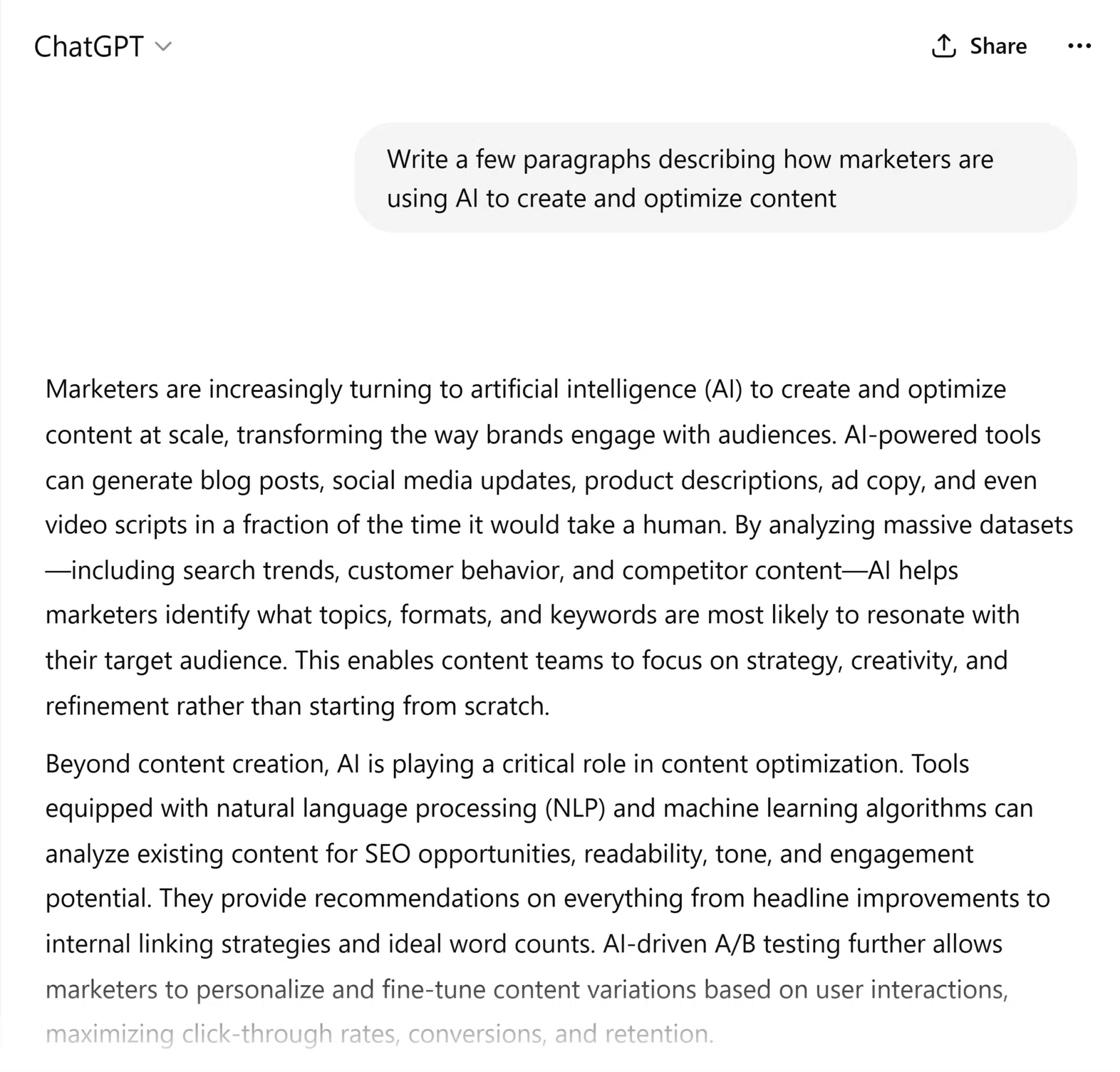
But the problem with AI-generated content isn’t a matter of style. The bigger issue with it is that one piece of unedited AI-generated content is the same as another in the eyes of the search engines. They all—by design—summarize the current consensus on whatever topic they’re tackling.
Predictive analytics & customer insights
Most marketing teams are drowning in so much data that they can’t separate the signal from the noise. Before AI, very few teams had the capacity to keep on top of the deluge of data coming their way through their web analytics dashboard, social listening tools, customer surveys, and sales call transcripts—just to name a few.
So it’s no wonder that “getting performance analytics” ranked third in Salesforce’s recent survey of marketers’ top AI use cases—and that same report revealed that 63% of marketers use it to analyze market data.
As Tooba Durraze, Founder and CEO of data analytics firm Amoeba, told us last year,
“Predictive [AI] models can estimate customer lifetime value, forecast campaign ROI and lead conversion potential. This allows marketers to allocate resources where they will have the greatest impact.”
While humans can still do many tasks better than AI, artificial intelligence can mine a dataset for patterns more effectively than any human. Feed the right AI tool the data at your disposal and it can help you quickly identify the people most likely to convert into long standing customers—and even the messaging to target them with.
That allows marketing teams to make data-backed decisions rather than relying purely on intuition. It also allows them to make those decisions faster, since AI automates the time-consuming task of trawling through a mountain of data for insights. This all ultimately frees up time for marketers to do what’s always being asked of them—doing more with less.
Your Competitors Are Already Tracking Their AI Search Visibility—Are You?
✓ See exactly where competitors appear in ChatGPT, Perplexity, and Gemini
✓ Compare your AI search share of voice vs. top 5 competitors
✓ Identify AI visibility gaps you can capture this quarter
Built for enterprise martech stacks
Audience segmentation & targeting
Clearly-defined customer profiles are the foundation of every successful marketing strategy. If you don’t understand exactly who you’re targeting, where they spend time, and what their biggest pain points are, your marketing efforts are going to miss more often than they hit.
But traditional audience segmentation strategies are incredibly time-consuming and budget-intensive. Analyzing customer interviews and survey results by hand can take weeks—and that’s just the first step in the process. Which means that marketers don’t refine their research as often as they probably should. Plus, no matter how objective they try to be, the end results are always going to be biased by the preconceptions of the person doing the research.
Marketers are using AI-powered market segmentation strategies—like this one Lisa Peyton shared with us—to do deeper audience research, faster. Instead of having to rely on their intuition to fill out parts of their customer profiles, artificial intelligence is helping them bake data-driven insights into their segments. In fact, these capabilities have quickly become core parts of every marketing automation tool.
For example, the cosmetics giant L’Oréal achieved a 22% conversion rate—and 55% click-through rate—on a media campaign powered by real-time, AI-driven audience segmentation. Artificial intelligence analyzed L’Oréal customers’ preferences, skin tone data, and browsing history, then delivered product recommendations tailored to their customer profile across its site and social media.
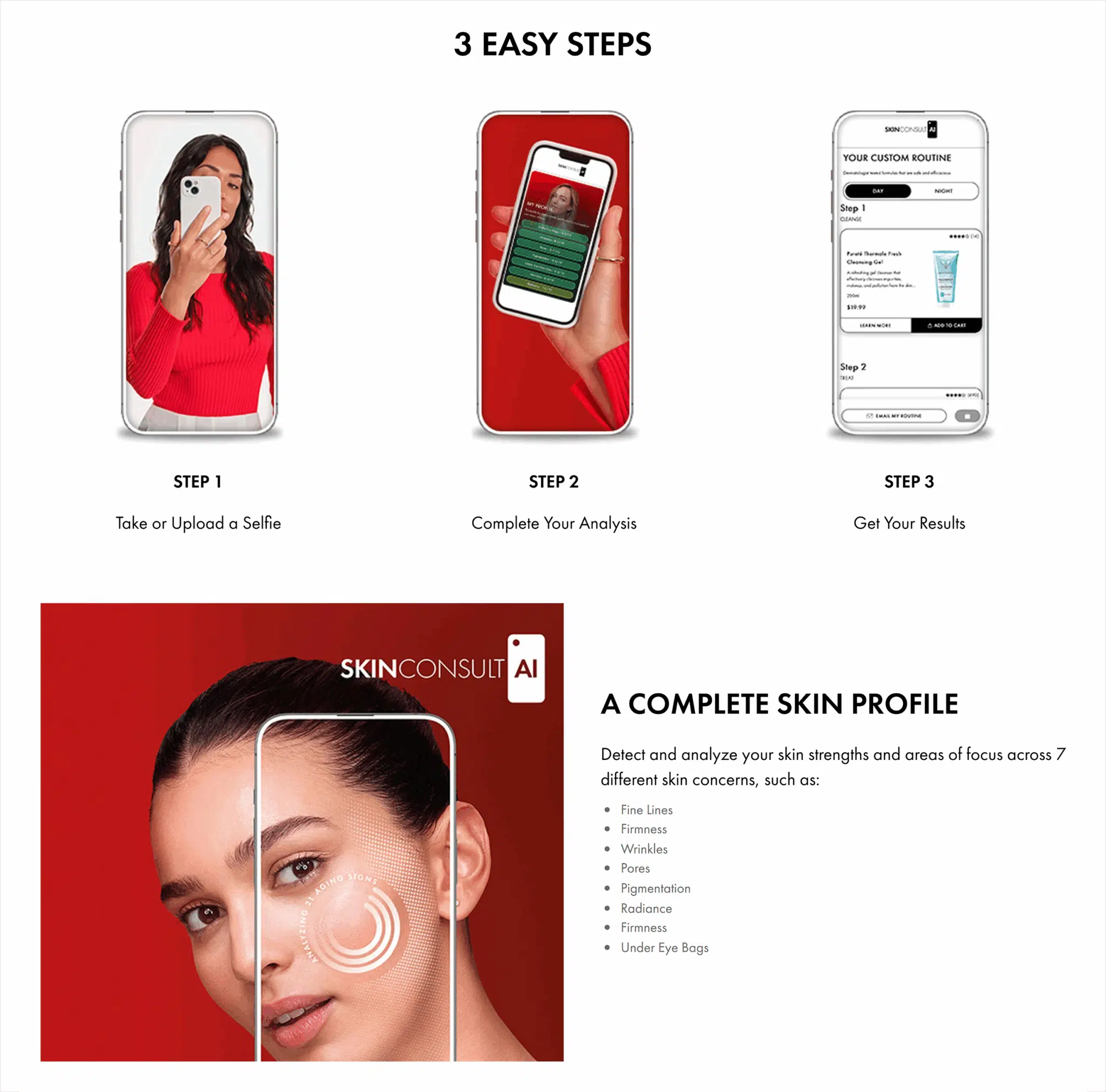
For brands like L’Oréal, AI has turned audience segmentation from a slow, budget-intensive process into a way of refining campaigns in real-time. That’s making their customer profiles more accurate—and more useful—than ever.
Chatbots & customer service automation
AI-powered chatbots have revolutionized the customer service industry in just a few short years, leveraging advances like natural language processing to create experiences that feel very much like interacting with another human.
A few years ago, you’d know you were speaking to a human when you contacted a company through the chat function on its site. Today, there’s a decent chance you’ll actually be speaking to an AI agent. According to a survey of 1,000 business leaders performed by Intercom, 37% of businesses use chatbots for customer support interactions.
Companies usually use these bots to answer basic questions, like updating customers on their order’s delivery status or letting them know whether an item is in stock. They’ll then usually pass people on to a human agent when they’re asked a question they can’t answer.
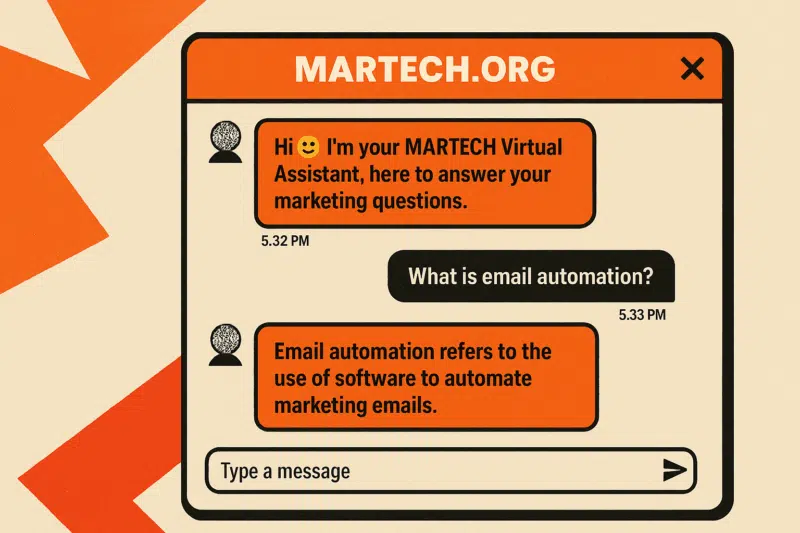
For example, 50% of Airbnb’s US users have used its AI bot for customer service. And Brian Chesky, the company’s CEO, says the bot has “led to a 15% reduction in people needing to contact live human agents.”
Research by Zendesk revealed that 51% of consumers actually say they prefer interacting with bots over humans when they want immediate service—perhaps because Intercom’s research found chatbots respond 3x faster to inquiries than human agents. So, it’s no wonder that marketers rated “automating customer interactions” as their top AI use case in a recent survey by Salesforce.
However, as with any AI tool, customer service chatbots shine when they support humans rather than replace them. Just ask Air Canada, which had to honor the refund policy its chatbot completely made up, then quietly remove the bot from its site. Or Klarna, which backtracked on its decision to replace all its human customer service agents with chatbots last year when their results weren’t quite as shiny as expected. What Klarna’s CEO, Sebastian Siemiatkowski learned from their attempt to completely replace human service reps with AI is that “what you end up having is lower quality.”
AI chatbots can help your customers get answers to their questions faster. Just be sure that you are using AI to improve your customer experience and not making costly blunders, like Air Canada or Klarna’s.
Media buying & ad performance optimization
Media buying is another area where artificial intelligence shines. It can test distinct creative assets on different platforms at various times at scale to quickly determine the most effective combination. And it can A/B test your ads in real time, making sure you’re always getting the best bang for your buck on your media spend.
For example, if you provide Google Ads with your conversion goals, budget, and creative assets, its AI-driven Performance Max system will automatically create different ad variations and test them across channels. It does this by using real-time auction data and machine learning to determine the best combination of ad formats, placements, and audiences for each platform.
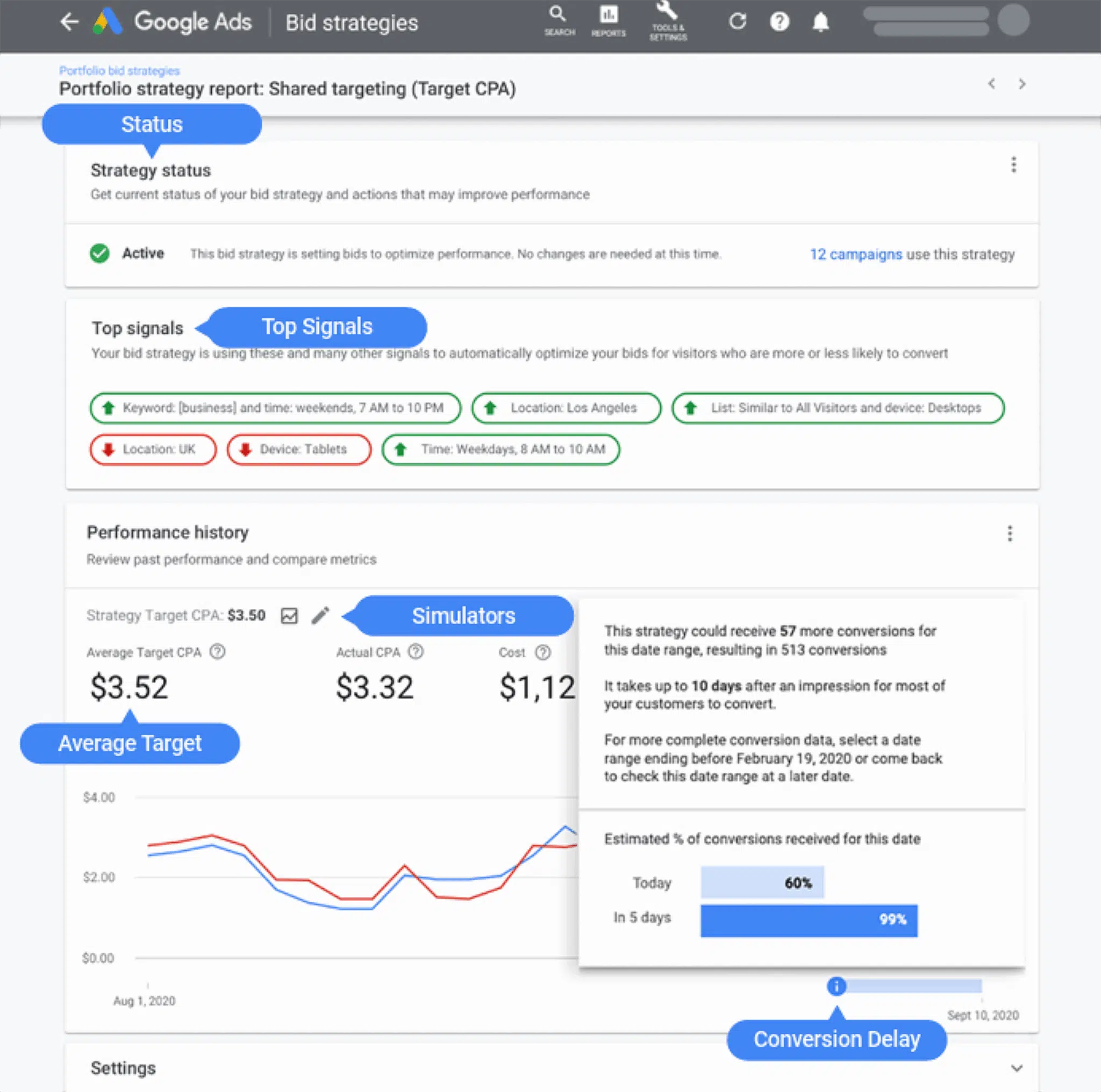
Of course, this all needs human overview to make sure AI is always pushing out ads that align with your brand (and internal metrics) and isn’t making unsupported claims about your product or service. But ultimately, AI can help to optimize your ad campaigns more efficiently than any human ever could.
“I would never have a human do this again,’’ said Courtney Connell, Marketing Director of Cosabella, after fully automating its search and social ads with AI increased the company’s return-on-ad-spend (ROAS) by 50% and decreased its ad spend by 12%. As Cosabella’s experience shows, outsourcing your ad performance optimization to AI can be a great way to test what kind of impact this technology can drive in your business before you roll it out across your entire business.
Marketing ops & workflow automation
AI is automating the grunt work and freeing up marketing teams to focus on more strategic tasks. So it’s not surprising that Influencer Marketing Hub’s latest AI Marketing Report Survey revealed 69% of marketers have already integrated AI into their marketing operations. And according to research by CoSchedule, a massive 84% of those marketers say AI is saving their team time each week—with 13% saying it’s saving them 11 or more hours every week.
Today’s most effective marketing teams are mapping out their workflows and assigning the steps that need a human touch to a team member. Then they’re outsourcing the rest to an AI tool.
Today, AI tools are often being used to:
- Summarize meetings and assigning follow-up tasks to attendees
- Remove duplicate entries from a list of target keywords
- Summarize long-form content into short snippets
- Write meta descriptions and image alt tags
- Score and prioritize sales leads
- Generate lists of actionable insights from reports or recordings
- Personalize customer emails en masse
For example, AI might take the first pass at a brand’s GA4 data and highlight some top-level trends, giving a marketing manager a head start when it comes to reviewing the performance of a campaign. They can then dive deeper into the AI-identified patterns to understand the context behind anomalies—like why traffic spiked on certain days or which audience segments drove unexpected conversions—and make strategic decisions about budget reallocation or campaign pivots.
These workflow automations aren’t just saving marketing teams time—they’re also freeing them up from having to spend part of their workweek on low-skilled, repetitive tasks like collecting and formatting data in a spreadsheet. And that means they get to spend more of their time on the creative tasks they got into marketing for, like developing messaging that resonates with their target audience and launching campaigns that have a real impact on people’s behaviour.
How to evaluate AI marketing tools
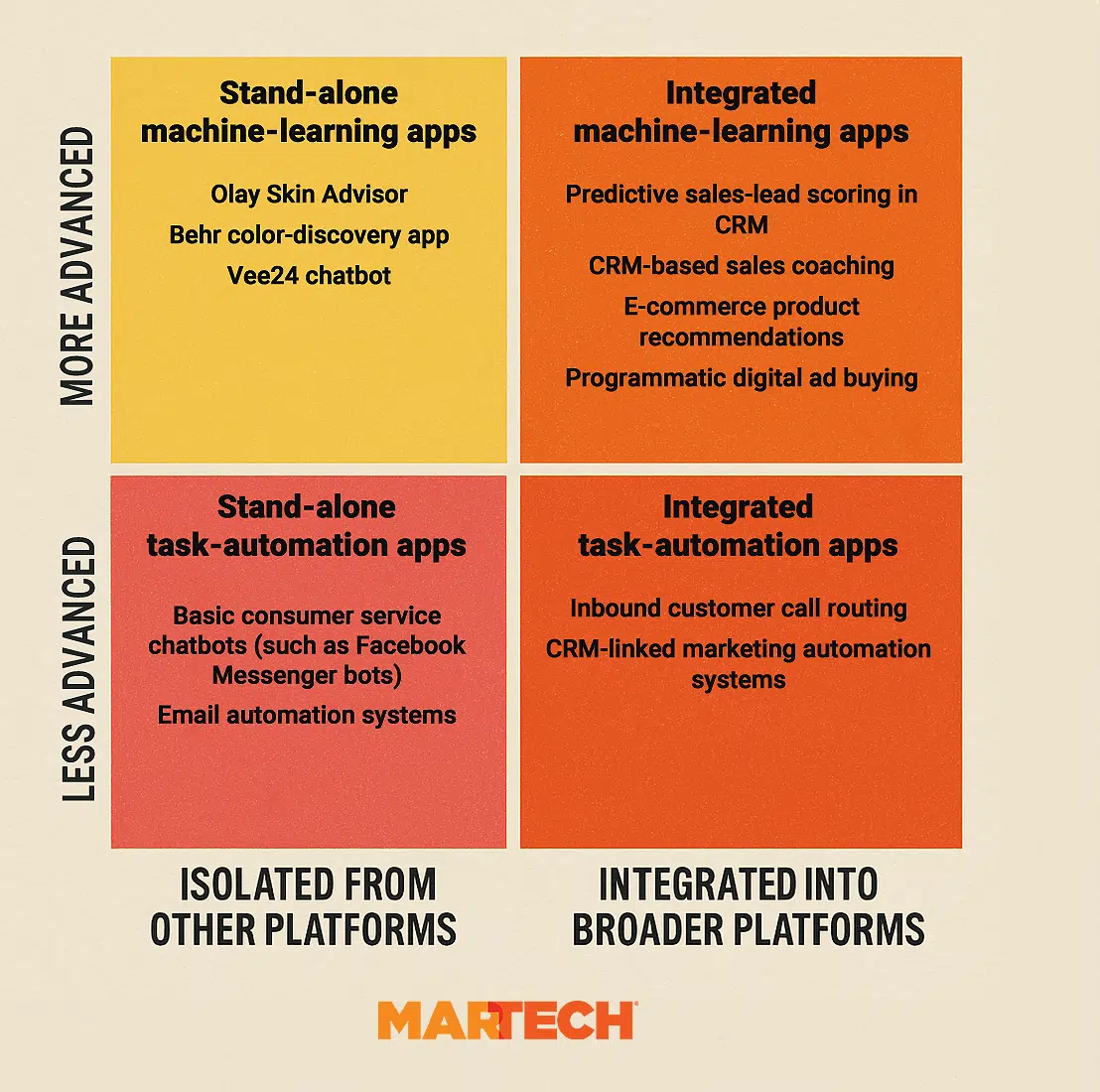
There are a lot of AI marketing tools on the market—and the number is only growing.
So, how do you decide which to invest in for your team?
We recommend focusing on two variables:
- Intelligence level: Whether the tool involves basic task automation or more advanced machine learning
- Structure: Whether the application is stand-alone or integrated into existing platforms
This separates AI marketing tools into four categories:
- Stand-alone machine-learning apps: Tools that use sophisticated machine learning models to perform a single task, such as sentiment analysis tools and facial recognition apps
- Integrated machine-learning apps: Tools that serve a broader purpose within your organization that have machine-learning features baked in, such as sales CRMs with predictive sales-lead scoring or e-commerce platforms with product recommendation engines
- Stand-alone task-automation apps: Tools that automate a specific task, such as customer service chatbots or AI notetakers
- Integrated task-automation apps: Multi-purpose applications with AI-powered task-automation features, such as project management tools that automate workflows or email clients that use generative AI to draft emails
The right AI marketing tools for you will depend on how far along the path to integrating artificial intelligence into your marketing strategy you are. To begin with, you might want to start experimenting with the task-automation features of the integrated applications you already happen to be using internally. From there, you might move on to using stand-alone and integrated machine learning-powered tools in customer facing settings.
The challenges and ethical considerations of AI
AI makes for an incredibly useful marketing tool—as long as you know its limitations.
For example, AI might recommend increasing ad spend on a keyword that’s performing well, but it won’t necessarily understand that the spike in performance is due to a one-time event like a holiday sale. Or you might ask it to summarize a PDF and, instead of letting you know it can’t open the file, it could make up a summary based on the title of the file.
So, be sure to always keep the following challenges in mind when using AI marketing tools.
Accuracy, hallucination, and misinformation risks
Outside of any ethical considerations, AI’s biggest drawback is its tendency to make things up. Which means you have to fact-check everything artificial intelligence tells you.
Otherwise, you could end up like the marketing consultant who was fired by Lionsgate after accidentally adding fake quotes from famous movie critics to the trailer for Martin Scorsese’s film Megalopolis after seemingly failing to check what ChatGPT told him. Or the Esquire writer who ran a story stating George Bush Sr. granted his son, Neil Bush, a presidential pardon—something which never happened.

The companies behind every LLM and AI marketing tool are rushing to fix the misinformation risks generative AI poses. But it’s yet to be seen whether there’s ever going to be such a thing as a completely accurate artificial intelligence. And as of now, there isn’t.
Bias in AI outputs and its impact on marketing decisions
Even if AI models can overcome their tendency to hallucinate, they’re still influenced by the biases of the people who created them and the data they’re trained on.
For example, WIRED recently reviewed hundreds of AI-generated videos created by OpenAI’s Sora and regrettably concluded that Sora’s model “perpetuates sexist, racist, and ableist stereotypes in its results.”
Marketers need to be particularly wary of these biases. If they go unchecked, they could influence everything from a brand’s customer personas to its marketing collateral itself.
While AI companies are taking steps to strip their models of any biases, investigations like WIRED’s prove they still have a long way to go.
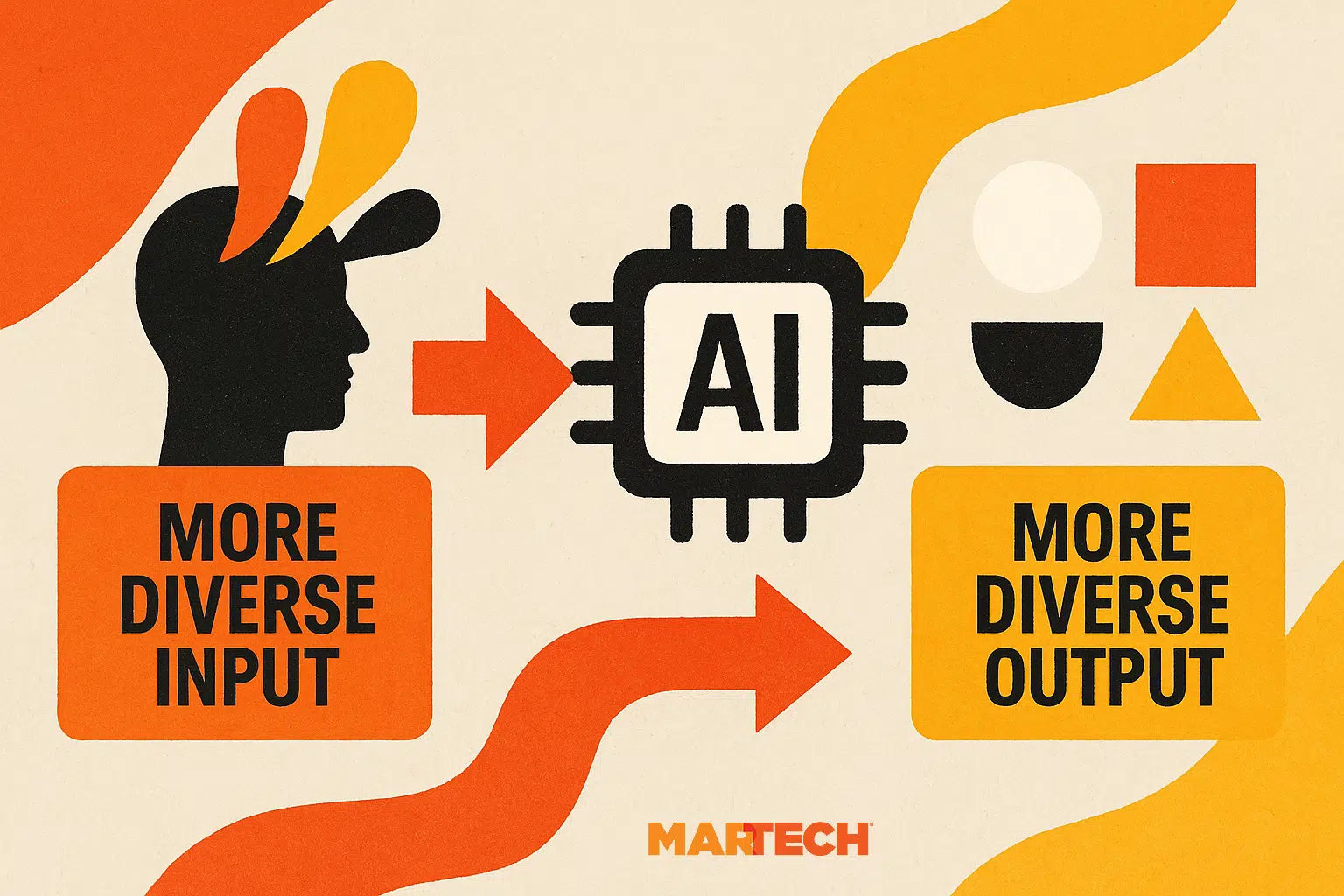
So, to avoid falling into this trap, marketers should regularly review the data they’re feeding their AI tools. If your customer data skews toward certain demographics or your content examples lack diversity, your AI outputs will reflect those limitations.
Of course, a diverse team will have fewer blind spots than one that’s made up of people who all look the same and have similar backgrounds. Which is just one reason diversity and inclusion practices are so important within marketing teams.
Data privacy and regulatory compliance (GDPR, CCPA, etc.)
Despite the fact 36% of marketers have AI infused into their daily workflows, according to research by the Marketing AI Institute—and 15% “couldn’t live without AI”—an alarming 39% of marketers don’t know how to use generative AI safely, according to research by Salesforce.
A big part of that is a lack of understanding around data privacy. AI models are trained—in part—on personal data people didn’t necessarily know they were handing over to companies when they agreed to their Terms and Conditions. For example, did you know LinkedIn is quietly training AI on US user’s data, and you need to actively opt out if you want to stop it?
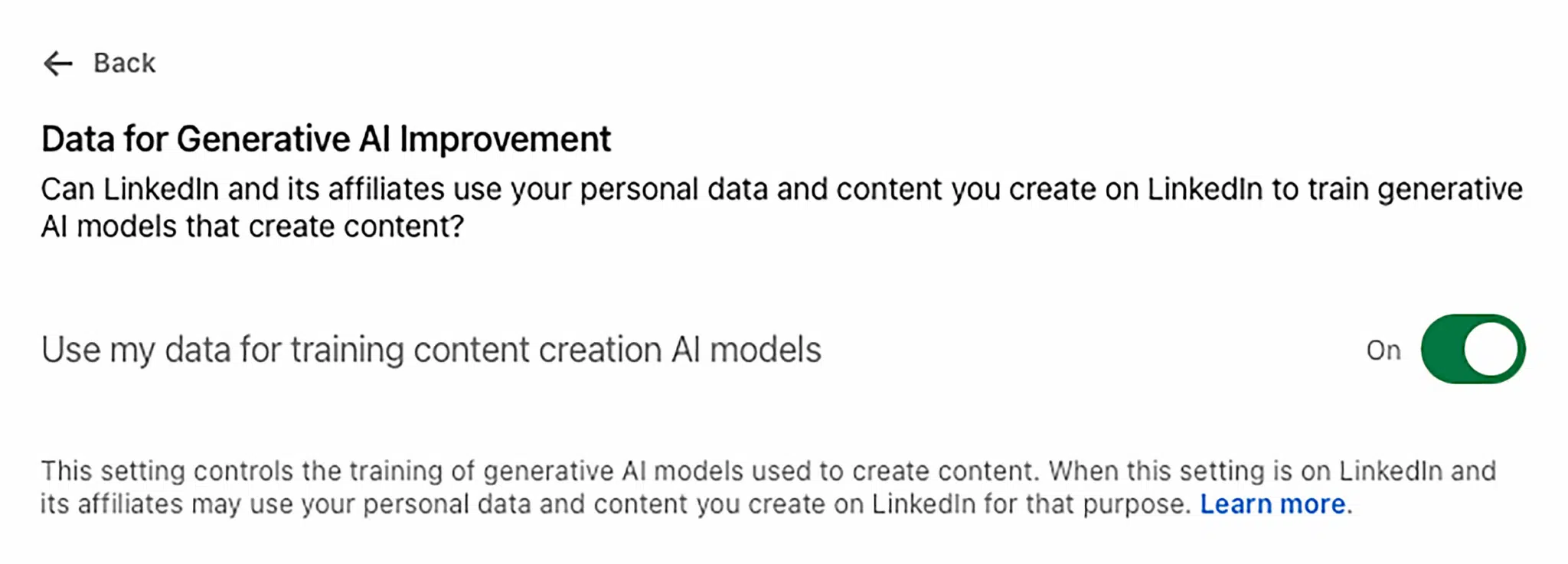
AI companies—and their tools’ users—need to be aware of their duty to consumers’ data under the regulations of every jurisdiction they operate in. Failure to comply with these laws such as the EU’s GDPR laws and the California Consumer Privacy Act could lead to a hefty fine.
Over-reliance and the erosion of brand voice
If we all use AI to write, we all start to sound the same. Remember: the output of a large language model is an aggregate of all the data that’s available to it. The reason AI overuses cliche phrases like “in today’s fast-paced world?” The content it’s been trained to emulate also overuses the phrase “in today’s fast-paced world.”
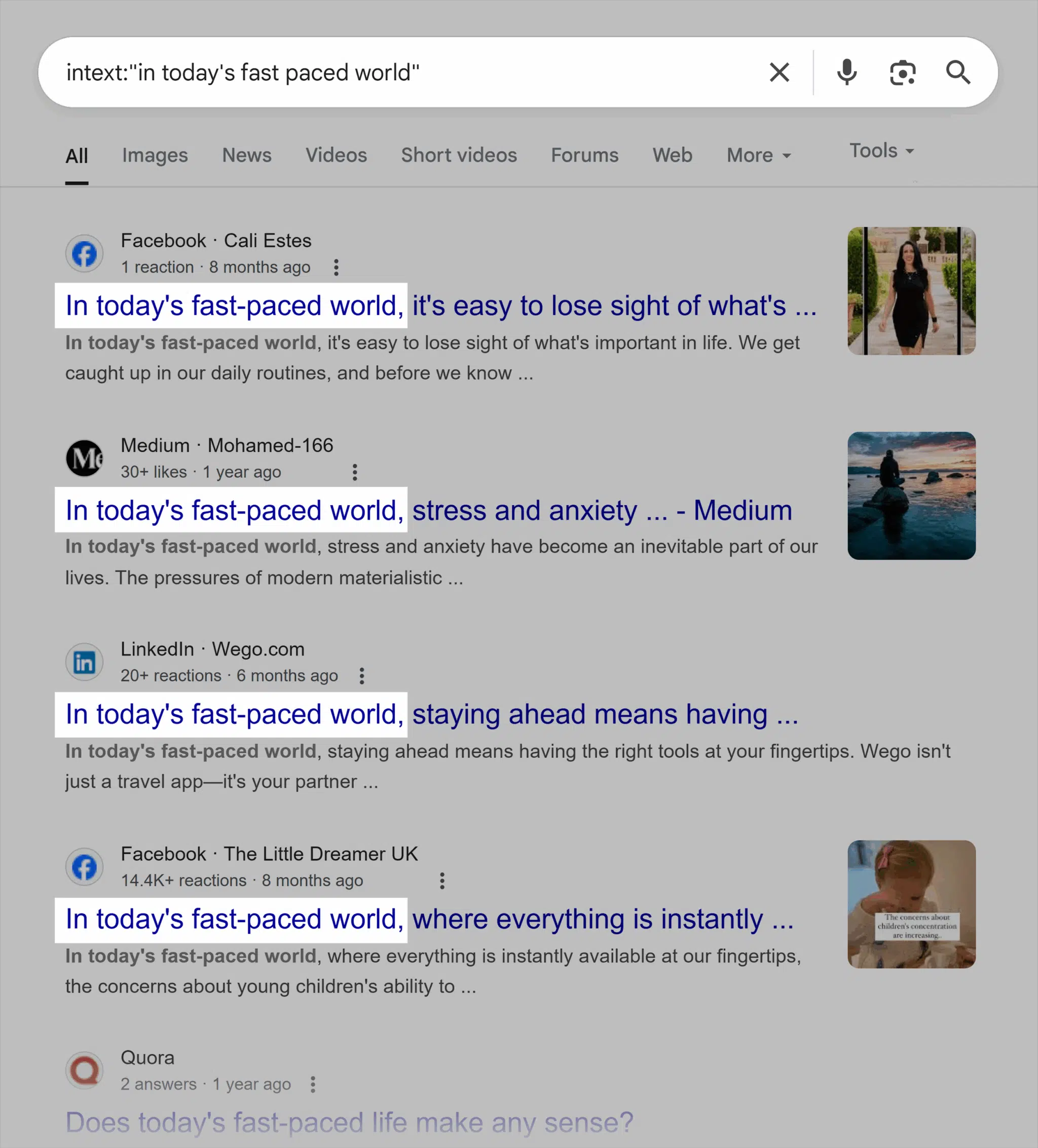
Which means—by design—any content produced by an AI tool will be riddled with cliches. You can prime the tools on your company’s tone of voice document and feed it a series of elaborate prompts to try to mitigate that. But you’ll never be able to eliminate hackneyed phrases from AI-generated copywriting entirely.
If you want to maintain a strong brand voice, you should only use AI-generated content sparingly—and never publish it without passing it through a thorough human review. Plus, you should think twice before using AI to help create thought leadership content. If the purpose of an article is to express a unique point of view based on hard-earned expertise, then leaning too heavily on generative AI is going to be counterproductive. After all, it’s designed to give you the consensus answer on a topic—the polar opposite of a thought leadership piece.
Ready to pick the right AI marketing tool for your team? Here’s our advice
First, tackle the low-hanging fruit. If you haven’t mapped out your workflows and outsourced the grunt work to LLMs then start there.
Next, think about:
- The skills gaps on your team
- The tasks your teammates perform most often
- The tools in your current stack with existing AI features
If you can use a tool you already pay for to compensate for a blind spot in your team’s skills or shave time off a task you perform multiple times each month, then you can make some serious efficiency gains at no extra cost.
Once you’ve explored those opportunities, it might be time to use the framework we’ve laid out here to explore AI marketing tools that can help you refine your strategy, execute campaigns more effectively, and automate monthly reporting.
A subscription to the paid tier of one of the major LLMs, like ChatGPT or Google’s Gemini, is often a great place to start. Not sure which is right for your needs? Check out our comparison of the major LLMs to find out.
New on MarTech